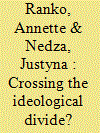| Srl | Item |
| 1 |
ID:
144886


|
|
|
|
|
| Summary/Abstract |
An important strand in the literature has stressed the analytical distinction between the Muslim Brotherhood's brand of Islamism and the Salafist movement. This article examines the shifts that have occurred within these two movements in Egypt since the Arab Spring. It specifically asks whether approximations between them in terms of strategies of actions have been paralleled by ideological approximations. The article argues that both movements have seen increased diversification which has—especially at the fringes—involved a reshaping of identities and ideological approximations that may facilitate cooperation between segments of these movements in the future.
|
|
|
|
|
|
|
|
|
|
|
|
|
|
|
|
| 2 |
ID:
144887


|
|
|
|
|
| Summary/Abstract |
Rebel involvement in drug trafficking is broadly found to prolong and intensify civil wars. Being an illicit good with strong demand, high profit margins, limited barriers to entry, and few interdiction opportunities, narcotic drugs disproportionately benefit rebel groups as a source of funding in civil wars. Furthermore, drug trafficking is believed to prolong civil wars by creating war economies that benefit rebel groups, making them reluctant to engage in peace negotiations. However, recent peace agreements suggest that drug trafficking can in some cases be used to “buy off” rebel leaders, whereas other insurgents willingly relinquish this source of funding. This article compares attempts at conflict resolution in Colombia and Myanmar, focusing on the impact drug trafficking by Fuerzas Armadas Revolucionarias de Colombia (Revolutionary Armed Forces of Colombia) and United Wa State Army has on contemporary peace negotiations.
|
|
|
|
|
|
|
|
|
|
|
|
|
|
|
|
| 3 |
ID:
144888


|
|
|
|
|
| Summary/Abstract |
Recent research on lone-actor terrorism has found a high prevalence of mental health disorders among these offenders. This research note addresses two shortcomings in these existing studies. First, it investigates whether selection effects are present in the selection process of terrorist recruits. Second, it builds on the argument that mental health problems and terrorist behavior should not be treated as a yes/no dichotomy. Descriptive results of mental health disorders are outlined utilizing a number of unique datasets.
|
|
|
|
|
|
|
|
|
|
|
|
|
|
|
|
| 4 |
ID:
144884


|
|
|
|
|
| Summary/Abstract |
The domestic far-right movement has existed in the United States for many years. During that time, groups have appeared, disappeared, and reappeared. Unfortunately, very little is known about what causes these groups to disband. Prior research has focused on long-lived groups, but the majority of extremist or terrorist groups fail to survive for an extended period of time. This study examined a variety of external and internal correlates of organizational death identified from both terrorism and organizational literature, to empirically test which correlates lead to a group dying young.
|
|
|
|
|
|
|
|
|
|
|
|
|
|
|
|
| 5 |
ID:
144885


|
|
|
|
|
| Summary/Abstract |
Does religious identity prompt radical action? This article presents a model of individual-level radical action. Drawing mostly on collective action theory the article posits that organizational membership drives the effect of religious identity on individual-level radical action. Using survey data the article assesses the behavior of Jewish settlers in the West Bank in the face of the 2005 Gaza withdrawal. The article finds that contra the prevailing view, which holds that religious identity alone is sufficient to trigger violence, evidence suggests that organizational membership is a mechanism bridging religious identity and radical action. Longstanding arguments tying radical actions solely to religion may require substantial revision.
|
|
|
|
|
|
|
|
|
|
|
|
|
|
|
|